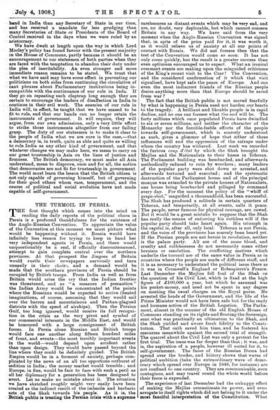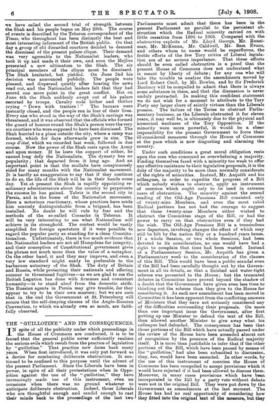THE TURMOIL IN PERSIA.
• THE first thought which comes into the mind on .1 reading the daily reports of the political chaos in Persia is a profound thankfulness for the existence of the Anglo-Russian Convention. To appreciate the value of the Convention at this moment we must picture what would be happening without it. Russia would have infinitely less reason for trying to keep in hand her very independent agents in Persia, and there would unquestionably be a real, if officially discountenanced, attempt to gain complete control over the northern provinces. At that prospect the Jingoes of Britain would rustle their newspapers nervously and turn uneasily in their chair3, and a demand would be made that the southern provinces of Persia should be occupied by British troops. From India as well as from Britain would arise the cry that the Indian frontier was threatened, and as "a measure of precaution" the Indian Army would be concentrated at the points where the Russians would be expected to arrive (heated imaginations, of course, assuming that they would sail over the barren and mountainous and Pathan-plagued districts with the speed of airships). Then the Persian Gulf, too long ignored, would receive its full recogni- tion in the crisis as the very pivot and symbol of our commercial interests in the Middle East, and would be honoured with a large consignment of British forces. In Persia alone Russian and British troops would face one another along fifteen hundred miles of front, and events—the most terribly important events • in the world—would depend upon accident rather than upon design. They would have passed beyond the line where they could, be definitely guided. The British Empire would be in a ferment of .anxiety, perhaps com- plicated by the news of an all too opportune outburst of sedition in India; the money market would tremble ; and Europe, in fine, would be face to face with such a peril as all her diplomacy for a generation has been designed to avert. Let us make no mistake about it. The situation we have sketched roughly might very easily have been created as the indirect result a the imbecile and barbaric acts V of the Shah towards his people. As it is, the British public is treating the Persian crisis with a supreme carelessness as distant events which may be very sad, and are, no doubt, very deplorable, but which cannot concern Britain in any way. We have said from the very moment when the Anglo-Russian Convention was signed that, in spite of the price paid for it, it was worth it, as it would relieve us of anxiety at all our points of contact with Russia. We did not foresee then that the test of the Convention would come so soon. It has not only come quickly, but the result is a greater success than even optimism encouraged us to expect. What an ironical comment events are making upon the misguided criticisms of the King's recent visit to the Czar ! The Convention, and the considered confirmation of it which that visit signalised, have kept safe the peace of Europe. And can even the most indiscreet friends of the Russian people desire anything more than that Europe should be saved from war ?
The fact that the British public is not moved fearfully by what is happening in Persia need not harden our hearts to the tragedy. A brilliant and likeable people is in rapid decline, and no one can foresee what the end will be. The forty millions which once populated Persia have dwindled to six or seven millions, and neither the character of the Monarchy nor the forcible-feeble efforts of the people towards self-government, which is scarcely understood as such, gives a glimmer of hope that either of these influences will end the oppression of the satraps under whom the country has withered. Last week we recorded the furious coup d'dat by which the Shah brought the Mejliss and the Nationalists to their knees in Teheran. The Parliament building was bombarded, and afterwards methodically reduced to ruin by wreckers ; many leaders of the popular party were shot down or arrested, and afterwards tortured and executed ; and the systematic destruction of the Parlianient house and of the principal mosque was extended to the private houses of Nationalists, one house being bombarded and pillaged by command every day. For the moment the policy of the "whiff of grape-shot," magnified a thousandfold, has been successful. The Shah has produced a solitude in certain quarters of Teheran, and temporarily, at all events, calls it peace. The people, never famous for physical courage, are cowed. But it would be a great mistake to suppose that the Shah has really the means of enforcing his ruthless will if the popular party should take heart again. His triumph in the capital is, after all, only local. Teheran is not Persia, and the voice of the provinces has scarcely been heard yet. If the Persian people are not heroic in revolution, neither is the palace party. All are of the same blood, and cruelty and ruthlessness do not necessarily mean either heroism or resolution. The conflicting motives which underlie the turmoil are of the same value in Persia as in countries where the people are made of different stuff, and it is as necessary to understand the political issue there as it was in Cromwell's England or Robespierre's France. Last December the Mejliss fell foul of the Shah on the question of his Civil List, which is fixed at the high figure of £100,000 a year, but which he assumed was his pocket-money, and need not be spent in any degree on meeting the usual charges on the Royal purse. He arrested the heads of the Government, and the life of the Prime Minister would not have been safe but for the ready and humane action of the British Legation. The Parlia- ment, almost in the manner of the old English House of Commons standing on its rights and flouting the Sovereign, sent what was practically an ultimatum to the Shah, and the Shah yielded and swore fresh fidelity to the Consti- tution. That oath saved him time, and he fostered his resources meanwhile against the second' trial of strength. The quarrel about the Civil List was only a pretext for the first trial. The issue was far deeper than that ; it was, and is, the aspiration of a people, however ill suited for it, to self-government. The fame of the Russian Duma had spread over the border, and history shows that waves of political ambition (take the extraordinary wave of demo- cracy which spread over Europe in 1848, for instance) are not confined to one country. They are communicable, even contagious, and may travel round the whole world before their force is expended.
The experience of last December had the unhappy effect of making the Mejliss overestimate its power, and even arrogate to itself rights which did not belong to it under the most fanciful interpretation of the Constitution. What we have called the second trial of strength between the Shah and his people began on May 28th. The course of events is described by the Teheran correspondent of the Times, who throughout has been distinctly the best and most interesting informant of the British public. On that day a group of old discarded courtiers decided to demand the dismissal of the present palace clique. Their demand was very agreeable to the Nationalist leaders, who took it up and made it their own, and soon the Mejliss presented a new ultimatum to the Shah. The six principal members of the clique must be dismissed. The Shah hesitated, but yielded. On June 2nd his decision was announced publicly. The people were pleased, and dispersed quietly after hearing the news read out, and the Nationalist leaders felt that they had scored one more point in the great conflict. But on June 4th the Shah suddenly swept out of his palace escorted by troops. Cavalry rode hither and thither crying "Down with traitors ! " The bazaars were instantly closed, and the people ran in fear of their lives. Every one who stood in the way of the Shah's carriage was threatened, and it was observed that the officials who formed the guard of honour round the Shah's person were the very six courtiers who were supposed to have been dismissed. The Shah hurried to a place outside the city, where a camp was formed, which for days afterwards grew in size. The coup d'état, which we recorded last week, followed in due course. Now the power of the Shah rests upon the Army and upon money. If he loses the support of either, he cannot long defy the Nationalists. The dynasty has no popularity ; that departed from it long ago. And an important point is that the mullahs have conspicuously sided for many months with the Nationalist movement. It is hardly an exaggeration to say that if they continue to do so, the life of the Shah will be in their bands some day. Yet at present the Shah is rapidly appointing re- actionary administrators about the country to perpetuate the success he has gained. Tabriz is the second city in Persia, and is the home of the Nationalist movement. Here a notorious reactionary, whose practices have made him scarcely distinguishable from a brigand, has been installed. No doubt he will rule by fear and the methods of the so-called Cossacks in Teheran. It will be very interesting to see what Nationalism will achieve in its stronghold. The contest would be vastly simplified for foreign spectators if it were possible to regard the popular party as standing for a clean Constitu- tionalism. Unfortunately, there is too much evidence that the Nationalist leaders are not all Hampdens for integrity, and their conception of Constitutional government gives the phrase not much more than the value of a metaphor. On the other hand, it and they may improve, and even a very low standard might easily be preferable to the barbarous autocracy of the Shah. The duty of Britain and Russia, while protecting their nationals and offering succour to threatened fugitives—as we are glad to see the British Legation has done with firmness and consistent humanity—is to stand aloof from the domestic strife. The Russian agents in Persia may give trouble, for they appear to try to be their own masters ; but we are sure that in the end the Government at St. Petersburg will secure that the self-denying clauses of the Anglo-Russian Convention, to which we already owe so much, are faith- fully observed.



















































 Previous page
Previous page